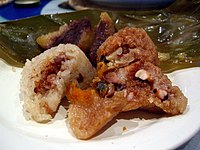zongzi
参见:zòngzi
英语[编辑]
其他写法[编辑]
- (来自威妥玛拼音) tsung-tze
词源[编辑]
Zongzi which have been cut open to reveal their fillings. The one in front is filled with pork, and the one in the background with red bean (azuki bean) paste.
切开以展示内馅的粽子。前面的是猪肉馅,后面的是红豆馅。
切开以展示内馅的粽子。前面的是猪肉馅,后面的是红豆馅。
源自官话 粽子 (zòngzi)的拼音转写,来自粽 (zòng) + 子 (zi, 指小后缀)。
发音[编辑]
名词[编辑]
zongzi (复数 zongzi 或 zongzis)
- 粽子
- 1953, Department for International Work, All-China Democratic Women's Federation(中华全国妇女联合会国际联络部) 编, Women of China [中国的女性], Beijing: Foreign Languages Press, →OCLC,页号 17,列号 2:
- The traditional fare around Dragon Boat Festival time is zongzi, pyramids of glutinous rice wrapped in reed leaves. The zongzi, it is said, symbolize the rice that the Miluo River people threw to the fish so that they would leave Qu Yuan's body undisturbed.
- 1979, China Reconstructs, Beijing: China Welfare Institute, →ISSN, →OCLC,页号 49:
- The people honor the memory of Qu Yuan on this day by eating Zongzi and holding dragon-boat races. Zongzi are little packets of glutinous rice with jujubes, ham and sweet bean paste added for interest, wrapped in leaves of rushes.
- 在这一天,人们通过吃粽子和赛龙舟来纪念屈原。粽子是一小包的糯米,里面加了枣子、火腿和甜豆沙,用芦苇叶包裹着。
- 2005, Lim Hin Fui(林廷辉), Fong Tian Yong(方天养), The New Villages in Malaysia: The Journey Ahead [马来西亚新村: 迈向新旅程], Kuala Lumpur, Malaysia: Institute of Strategic Analysis & Policy Research(战略分析与政策研究所), →ISBN,页号 126:
- A week or two before the festival, villagers would prepare glutinous rice wrapped in bamboo leaves before cooking, commonly known as zongzi or chang (in Hokkien).
- 节前一两个星期,村民们会在烹调前准备好用竹叶包裹的糯米,俗称粽子或“粽”(福建话)。
- 2011, Daniel Kalla, The Far Side of the Sky: A Novel of Love and Death in Shanghai, Toronto, Ont.: HarperCollins, →ISBN; paperback版, New York, N.Y.: Forge/A Tom Doherty Associates Book, 2015, →ISBN:
- Sunny ordered four zongzis or dumplings and, out of tradition, haggled with the woman until they agreed on a price.
- 桑尼点了四个粽子或者饺子,并打破传统,与这位女士讨价还价,直到他们最后确定价格。




